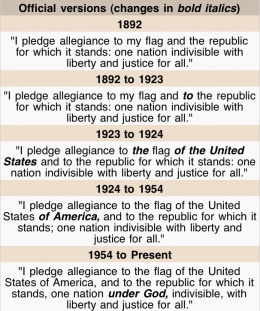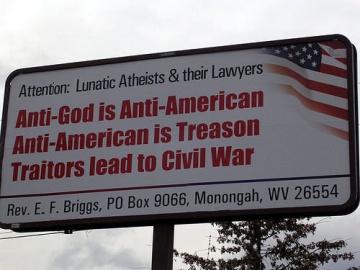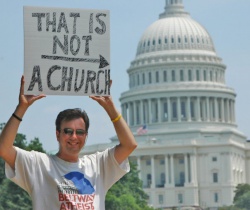One Nation Under God
Latest revision as of 23:33, 21 January 2012
History and Origin of the Pledge of Allegiance
The original Pledge of Allegiance was meant as an expression of patriotism, not religious faith.
It made no mention of God.
The pledge was written in 1892 by the socialist Francis Bellamy, a cousin of the famous radical writer Edward Bellamy. He devised it for the popular magazine Youth's Companion on the occasion of the nation's first celebration of Columbus Day. Its wording omitted reference not only to God but also, interestingly, to the United States:
"I pledge allegiance to my flag and the republic for which it stands, one nation indivisible, with liberty and justice for all."
The key words for Bellamy were "indivisible," which recalled the Civil War and the triumph of federal union over states' rights, and "liberty and justice for all," which was supposed to strike a balance between equality and individual freedom. By the 1920s, reciting the pledge had become a ritual in many public schools.
Adding "God" to the Pledge of Allegiance
In the 1950s, Secretary of State John Foster Dulles believed that the United States should oppose communism not because the Soviet Union was a totalitarian regime but because its leaders were atheists.
Hand in hand with the Red Scare, to which it was inextricably linked, the new religiosity overran Washington. Politicians outbid one another to prove their piety. President Eisenhower inaugurated that Washington staple: the prayer breakfast. Congress created a prayer room in the Capitol. In 1955, with Ike's support, Congress added the words "In God We Trust" on all paper money. In 1956 it made the same four words the nation's official motto, replacing "E Pluribus Unum." Legislators introduced Constitutional amendments to state that Americans obeyed "the authority and law of Jesus Christ."
The campaign to add "under God" to the Pledge of Allegiance was part of this movement. It's unclear precisely where the idea originated, but one driving force was the Catholic fraternal society the Knights of Columbus. In the early '50s the Knights themselves adopted the God-infused pledge for use in their own meetings, and members bombarded Congress with calls for the United States to do the same. Other fraternal, religious, and veterans clubs backed the idea. In April 1953, Rep. Louis Rabaut, D-Mich., formally proposed the alteration of the pledge in a bill he introduced to Congress.
The "under God" movement didn't take off, however, until the next year, when it was endorsed by the Rev. George M. Docherty, the pastor of the Presbyterian church in Washington that Eisenhower attended. In February 1954, Docherty gave a sermon—with the president in the pew before him—arguing that apart from "the United States of America," the pledge "could be the pledge of any country." He added, "I could hear little Moscovites [sic] repeat a similar pledge to their hammer-and-sickle flag with equal solemnity." Perhaps forgetting that "liberty and justice for all" was not the norm in Moscow, Docherty urged the inclusion of "under God" in the pledge to denote what he felt was special about the United States.
The ensuing congressional speechifying—debate would be a misnomer, given the near-unanimity of opinion—offered more proof that the point of the bill was to promote religion. The legislative history of the 1954 act stated that the hope was to "acknowledge the dependence of our people and our Government upon … the Creator … [and] deny the atheistic and materialistic concept of communism." In signing the bill on June 14, 1954, Flag Day, Eisenhower delighted in the fact that from then on, "millions of our schoolchildren will daily proclaim in every city and town … the dedication of our nation and our people to the Almighty." That the nation, constitutionally speaking, was in fact dedicated to the opposite proposition seemed to escape the president.
See also
- "In God We Trust"
- Is America a "Christian Nation?"
- America is a Christian nation
- America is not a Christian nation
- A nation of Christians is not a Christian nation
---
This site costs a lot of money in bandwidth and resources. We are glad to bring it to you free, but would you consider helping support our site by making a donation? Any amount would go a long way towards helping us continue to provide this useful service to the community.
Click on the Paypal button below to donate. Your support is most appreciated! |
|---|





